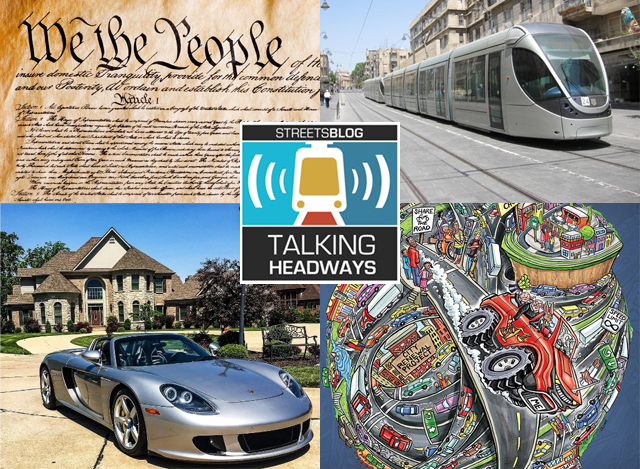This week we’re headed to the Iowa Law Review’s symposium, "The Future of Law and Transportation," organized by University of Iowa law professor Greg Shill. In this episode, we have three speakers sharing their papers:
- Jonathan Levine of the Taubman College of Architecture and Urban Planning at the University of Michigan discusses his paper, "Transportation Policy Entrenchment: Institutional Barriers to Accessibility Based Planning” and how institutional measurements of accessibility can be problematic in ways people don’t anticipate.
- Audrey McFarlane, associate dean of Faculty Research & Development at the University of Baltimore School of Law, discusses her co-written paper, “Black Mobility and the Refusal of Funds: Structural Racism and Mass Transportation Decision-Making" and discusses why structural racism allows for transit lines to be denied to disinvested communities and wonders why it’s OK for communities to ask for stops to be closed because of perception.
- Sara Bronin, the Thomas F. Gallivan Chair in Real Property Law at the University of Connecticut School of Law, discusses her paper, “The Failed Federalism of Street and Vehicle Design Standards." She wonders why we get stuck with rules and standards that we clearly know are not safe.
If you prefer to read rather than listen, an edited transcript is below the player. If you want a full unedited transcript (with typos!), click here.
First up, Levine:
In developing criteria, the office shall recommend potential metrics to measure a transportation impact that may include, but are not limited to, vehicle miles traveled, vehicle miles traveled per capita, etc. I would call this a step forward and it’s a necessary element in transportation policy reform. But I want to emphasize that the purpose of transportation planning is not mobility, but it’s also not reducing vehicle miles traveled.
Just to give you one way of thinking about this, I want you to imagine a planner choosing two different alignments for a transit investment. One goes through a rich area. One goes through a poor area. If that planners criteria is reducing vehicle miles traveled, the answer is clear, put your transit investment through the rich area. They are the ones who have a lot of cars. They are the ones who drive a lot. In other words, a problem definition that’s exclusively around vehicle miles traveled tends to privilege travel that’s high vehicle miles traveled to begin with, and assumes that if you’re not driving a lot, which poor people don’t because they can’t afford to, there is no transportation problem. So a vehicle miles traveled definition is a step forward from a mobility definition, but it can never be adequate as a definition of the transportation problem.
Next up, McFarlane:
What I’ve been thinking about is, is there a way that we can consider how structural racism plays into shaping the lack of the quality transportation that meets people’s needs? The influence of race and creating disinvested communities, the traditional opposition to public transit projects? And you have examples all over the country, as I’m sure this esteemed panel is aware of, of an announced public transit project.
And there was opposition Houston, Atlanta, Los Angeles, you know, all over. And so it seems to me that public transit is certainly stigmatized for a variety of reasons, but to the extent that class and race play a significant role in the, I guess the kind of a visioning about what it means or what it portends. So for example, we have an existing light rail line that goes from Baltimore down to the airport and passes through a suburban county. It’s mostly white, and, you know, they had started to petition to close stops on the light rail line because of their perception that it was bringing crime to their areas.
So they were angry petitioning, they felt entitled that they had the right to close off these transportation stops. So to the extent that mass transit is racialized and stigmatized, I would almost call it Black transit, depending on the particular areas. Is there a way that the process can be structured to address this inclination to basically torpedo mass transit projects?
Next up, Bronin:
So the truth is that we know what the right standards are both for a vehicle design and for a street design. And the problem is, we’re not using them. We know what protects human life, we know what contributes to climate change. We just are not incorporating those standards into our laws. And so for me, that question was why. And I think the why is really federalism. So we start with the Constitution and Professor McFarland mentioned a part of this, but part of that is that the 10th Amendment, which reserves certain powers to the state.
Now that sounds very simple, but of course, it’s not, there’s a lot of different ways to think about the relationship between federal state and local governments. And so we’ll just, you know, remind folks federalism is about the relationship between federal state and local governments. And there are lots of different ways to think about this. So there are some scholars who think that we should have clear boundaries for state and local control, and states role in the federalist system is really to assert their autonomy.






